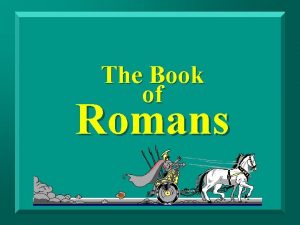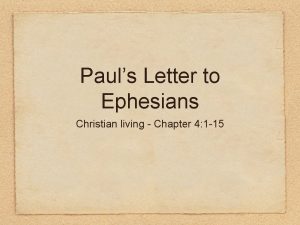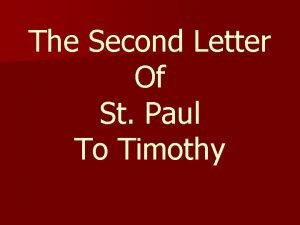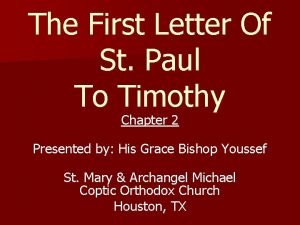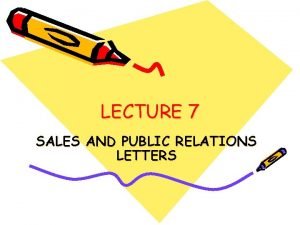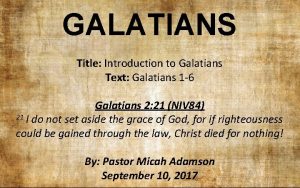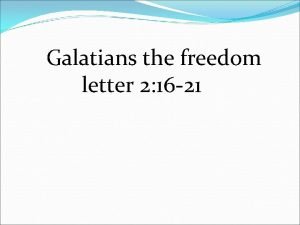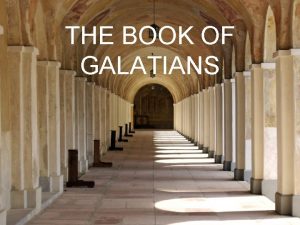The Letter Of St Paul To The Galatians


















- Slides: 18

The Letter Of St. Paul To The Galatians

Introduction • In this chapter St. Paul emphasizes that we are saved by the faith in Christ not by the works of the law • He also wondered that if they were begun in the Spirit, why seek to be made perfect by the flesh i. e. the works of the law (Gal 3: 1 -5) • Then he answered the question: Why was the law? And what is the purpose of it? • He concluded by explaining how through baptism that is based on our faith in Christ, we become sons of God

Justification by Faith (3: 1 -5) • Foolish: because they want to return back to the bondage of the law • Bewitched: by the Judaizers who brainwashed them. • Through his teaching, he portrayed the redemptive work of the crucified Jesus for their justification.

Justification by Faith (3: 1 -5) • He is challenging them how they received the Holy Spirit? • Works of the law cannot purify our internal man? They are just external practices (works of the flesh) • So how they want to be made perfect by works of the flesh after they had begun with the spirit! This is foolishness.

Justification by Faith (3: 1 -5) • When they believed, they suffered, so how they suffered if they were not justified? Was all of this in vain? • Also after they believed God started to work miracles in them? Was all of this by the works of the law or by the faith in Christ?

Example of Abraham (3: 6 -9) • In Gen 15: 6 it was written about Abraham that he believed God, and it was accounted to him for righteousness. • This was before the circumcision by about 15 years (Gen 17: 14) and before the law of Moses by 400 years. • The true children of Abraham are not those who born according to the flesh but who follow his faith.

Example of Abraham (3: 6 -9) • God did not say that in the law all the nations of the earth will be blessed, but in the Seed of Abraham (Gen 12: 3, 18: 18, 22: 18). • “In you” means “in your Seed” i. e. those who will believe, like you, in your Seed, shall be blessed. • Faith is the road to blessings and justification but the law if the road to the curse.

Curse of the Law (3: 10 -14) • It is written, “Cursed is everyone who does not continue in all things which are written in the book of the law, to do them” (Deut 27: 26) • Nobody was able to keep all the law. • So everybody was under the curse of the law. • So which way you like to choose blessings or curse?

Curse of the Law (3: 10 -14) • Habakkuk 2: 4 testified that the just shall live by faith and not be the works of the law. • The law is about works that you should do in order to be justified (Lev 18: 5) and not about believing in Christ. • In Deut 21: 23, it is written cursed is everyone who hangs on a tree

Curse of the Law (3: 10 -14) • So when the Lord died on the cross he became a curse to redeem all of us who are under the curse. • The curse of the law was a barrier prevented the gentiles from receiving the blessings of Abraham • After Christ has redeemed us from this curse, now the door is opened for the believers to receive the blessings of the Spirit.

Priority of the Promise Over the Law (3: 15 -18) • Brethren: compare with foolish • The Law, given 430 years after the promises to Abraham, did not nullify the covenant and its promises that God made with Abraham and his “Seed” that justification will be through faith. • He said “Seed” as singular. If he said “seeds”, this can be referring to the Jews.

Priority of the Promise Over the Law (3: 15 -18) • But because He said “seed” then He is referring to one person “Christ” • If the law can annul the promise, then the promise has no effect. • If the inheritance was based on the Law, then it is no longer based upon a promise; but it is obvious that God gave the inheritance by promise, not by the Law.

Purpose of the Law (3: 19 -25) • Why then was the law given by God? • To discipline us because of our transgressions till the Seed comes. • The law was given to Moses (the mediator) by the angels. • A mediator is between two, and this was the situation in the Old Covenant (God and us with a mediator in the middle).

Purpose of the Law (3: 19 -25) • But in the New Covenant, God became man and united us with Him and we are one in Him. So we are not two with a mediator but one in Him who is one. • So why we want to be separate again and have a mediator between us and God. • The Law was not against the promises of God, but served to discipline us until the promise by faith in Jesus could be given to those who believe

Purpose of the Law (3: 19 -25) • The scripture: the law and the Old Testament • Confined: revealed our sinful state and our need for the Savior and the impossibility to be justified by the law. • So, those who will believe in Christ will be justified.

Purpose of the Law (3: 19 -25) • Kept under guard: our works were because of fear not because of love and freedom. • Tutor: the purpose of the law to guide us to believe in Christ. • With faith we become spiritually mature and we do not under tutor.

Sons and Heirs (3: 26 -29) • Now we are the sons of God through faith and not the works of the law. • Those who are baptized in Christ (act of faith), put on Christ. • Regardless of our race, gender, social status. . . etc, we are the sons of God. • Through faith, we are children of Abraham and thus heirs of the promise.

Conclusion • To demonstrate that they were justified by faith in Christ and not by the works of the Law, what did St. Paul ask them? • What is the condition of those who are of the works of the Law? • What did Christ do by becoming a curse for us? • What purpose did the Law serve? How long was it to last? • How do we become heirs?
 St paul's letter to the galatians
St paul's letter to the galatians St paul's letter to the galatians
St paul's letter to the galatians Sky grass and root letters pdf
Sky grass and root letters pdf Letter to the galatians summary
Letter to the galatians summary Letter of saint paul to the philippians
Letter of saint paul to the philippians Paul's letter to timothy on leadership
Paul's letter to timothy on leadership Book of romans summary
Book of romans summary Letter of st paul to the ephesians chapter 4
Letter of st paul to the ephesians chapter 4 Second letter of st paul to timothy
Second letter of st paul to timothy Letter of st paul to the philippians
Letter of st paul to the philippians Letter of st paul to timothy
Letter of st paul to timothy Letter of st paul to the colossians
Letter of st paul to the colossians How to write a return address
How to write a return address Letter for placing an order
Letter for placing an order Block style business letter format with letterhead
Block style business letter format with letterhead A frendly letter
A frendly letter Discuss the nuances of sales letters.
Discuss the nuances of sales letters. A friendly letter
A friendly letter Writing friendly letters
Writing friendly letters






